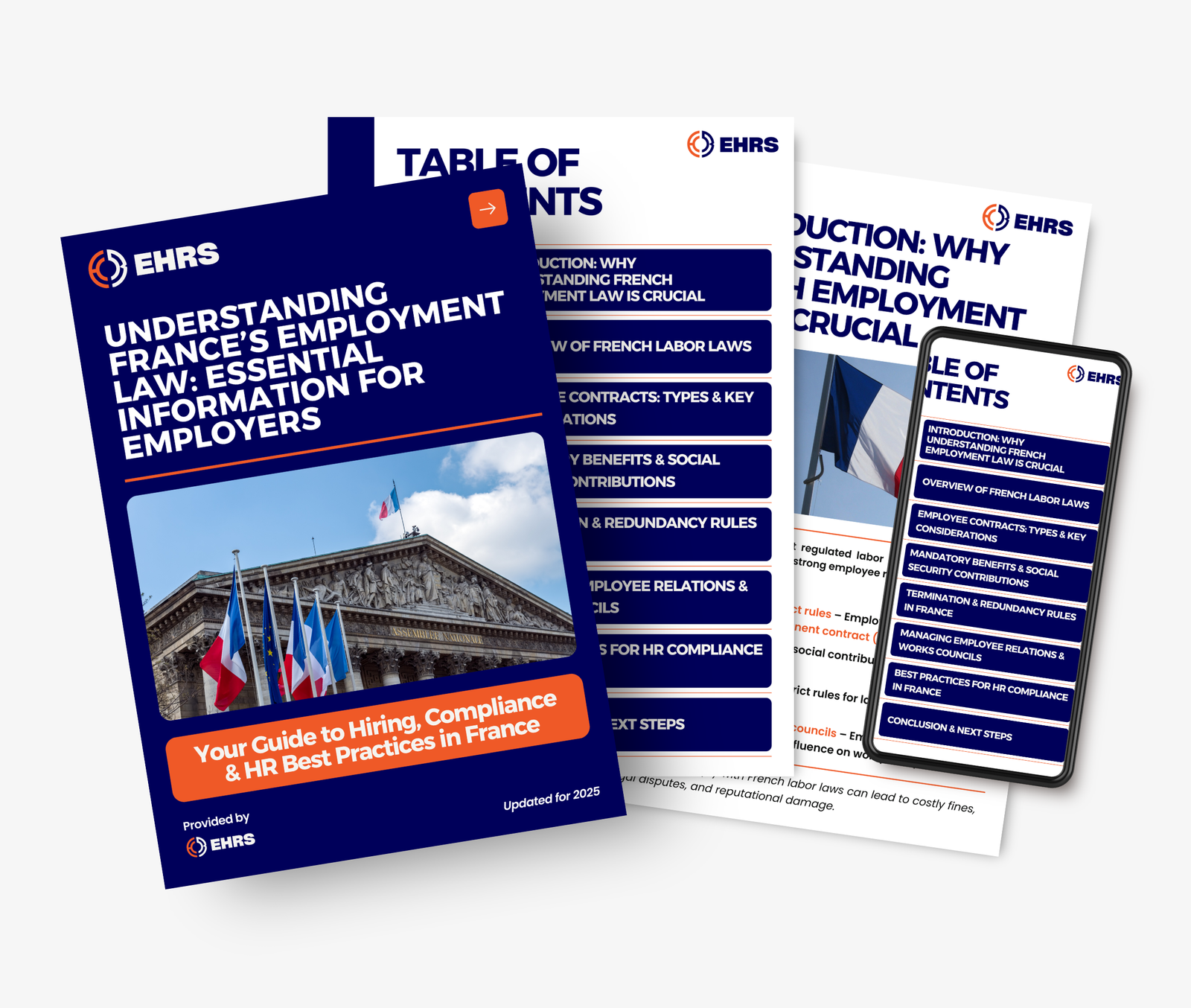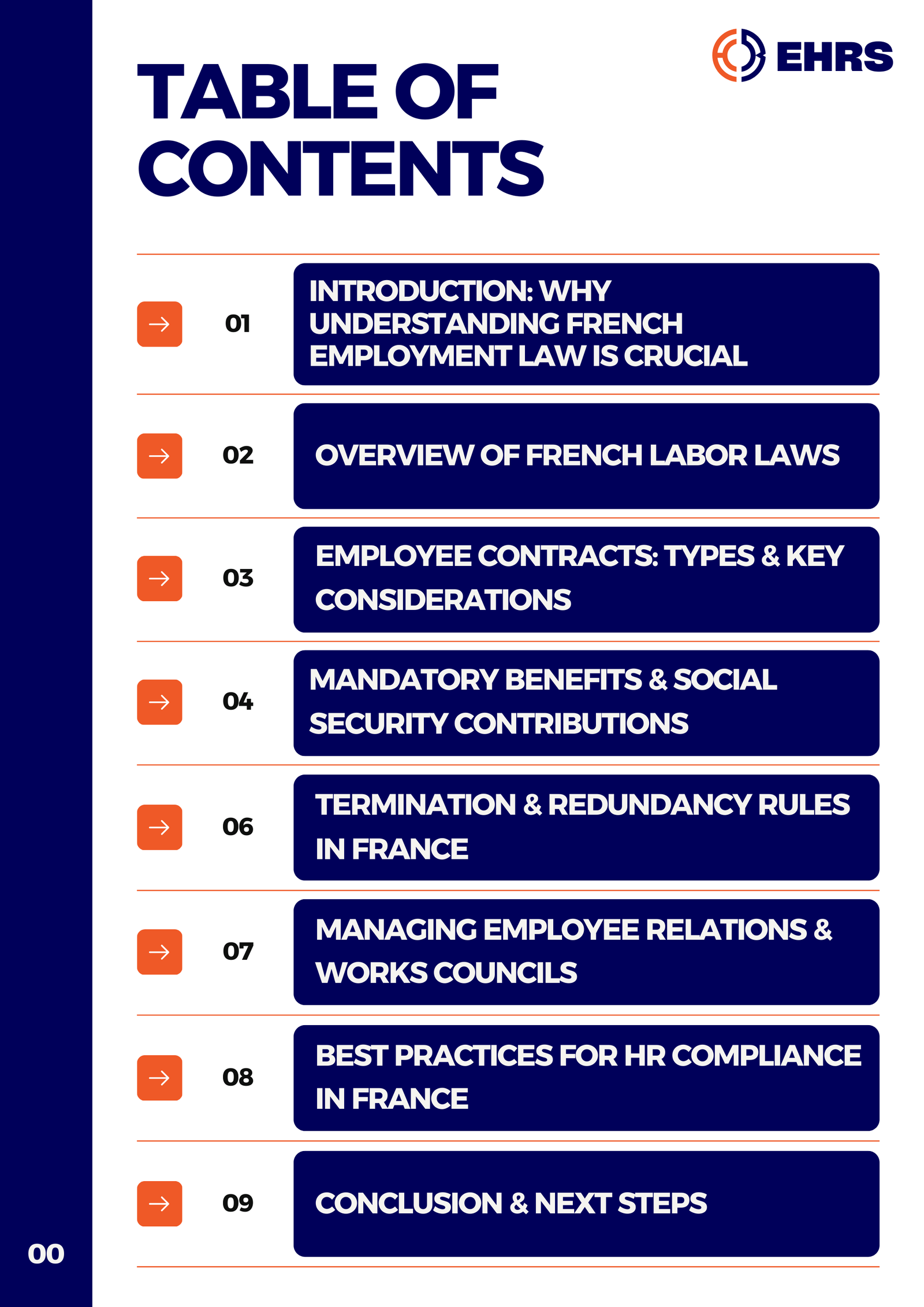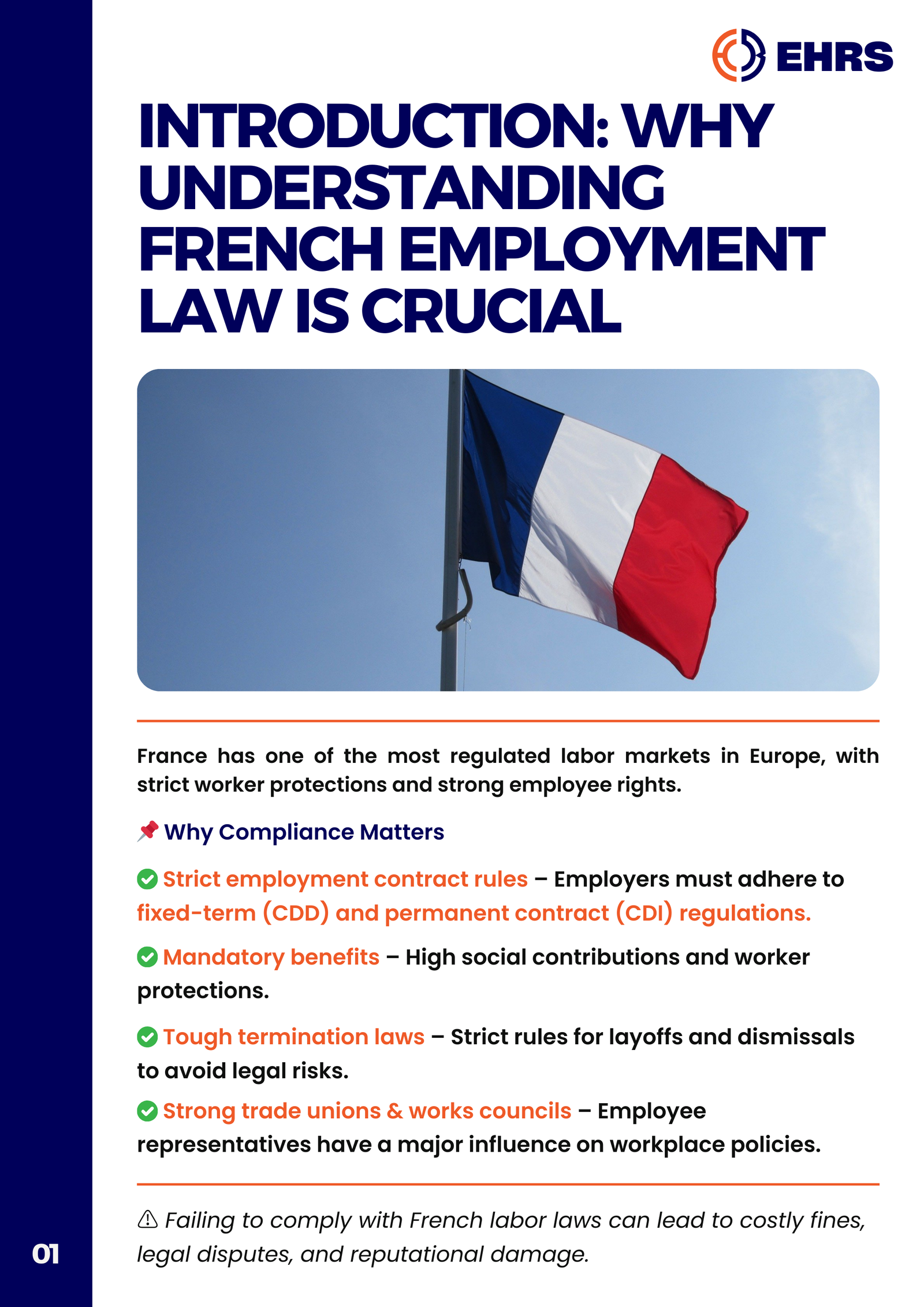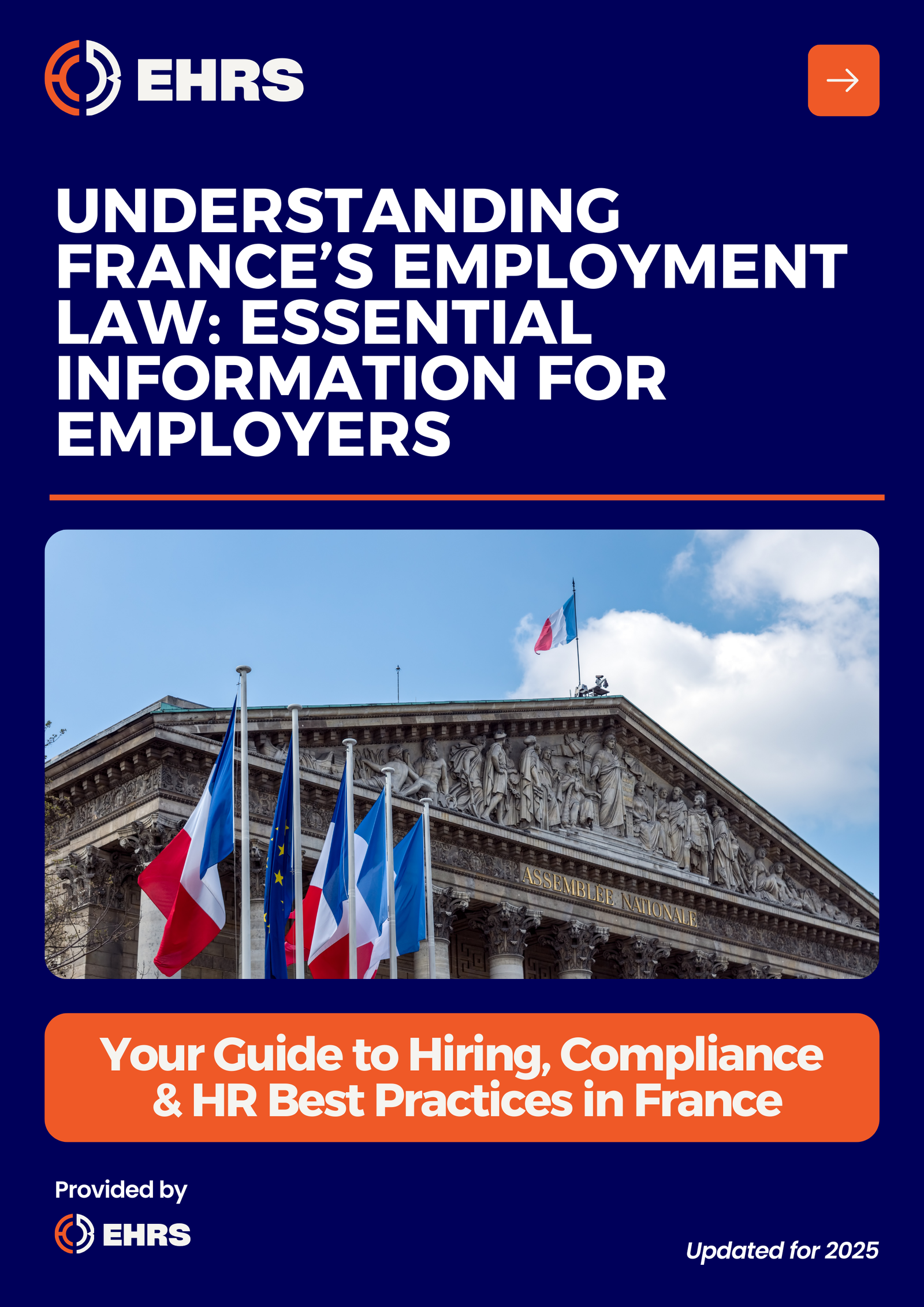FRANCE
List of countries
HR Services for France
Hire in France without opening a local entity. We manage employment contracts in line with the French Labour Code, handle mandatory social security and healthcare registration, oversee payroll, and ensure compliance with local tax and labor regulations—so you can expand quickly while staying fully compliant.
Business owners in the US and the UK have recognized the benefits of expanding into France for decades.
Today, there are 4,500 American companies operating in France. With over 500,000 people in France employed by these American firms, the US is the top foreign investor in the nation. Meanwhile, the UK has 2,000 firms in France.
ALL YOU NEED TO KNOW ABOUT
HR OUTSOURCING IN FRANCE
FRENCH EMPLOYMENT
REGULATIONS TO KNOW
THE BENEFITS OF
EXPANSION IN FRANCE
THE CHALLENGES OF
EXPANSION IN FRANCE

Check our free HR guide to help you quickly improve your HR in France
FAQ for France
Learn more about France
Free Download
Request your free guide and receive it immediately

All You Need to Know About Outsourcing
Your HR in France with EHRS
Efficient HR Management
Outsourcing your HR to Europe HR Solutions ensures seamless management of payroll, recruitment, compliance, and employee relations. Our expert HR services for France are tailored to French labor laws and business practices, helping you operate smoothly and compliantly.
Compliance Expertise
Navigating France’s complex labor laws and regulatory environment can be challenging. We ensure your HR policies align with national and EU standards, including collective labor agreements (CLAs).
Cost-Effective Solutions
By outsourcing HR, you reduce the overhead costs of an in-house team while benefiting from expert guidance that helps you avoid compliance fines and inefficiencies.
France Employment Regulations to Know
Employment Contracts
All employees in France must have written contracts, typically specifying terms such as salary, working hours, and conditions for termination. As part of our comprehensive HR services for France, we ensure both fixed-term and indefinite contracts comply fully with French labor law and collective labor agreements (CLAs).
Working Hours and Overtime
The standard workweek in France is 35 hours. Any additional hours worked must be compensated as overtime, with specific rules outlined in employment contracts or collective agreements.
Employee Benefits
French labor law requires employers to provide social benefits, including health insurance, pensions, paid vacation (a minimum of 5 weeks), and mandatory contributions to social security schemes.
The Benefits of Expansion in France
Access to a Large Market
France is the second-largest economy in the EU, offering access to a diverse consumer base and strong business opportunities across various sectors.
Skilled Workforce
France boasts a well-educated and highly skilled workforce, particularly in technology, engineering, and finance. English proficiency is common among professionals.
Strategic Location
France’s central location in Europe makes it an ideal hub for international business operations, with excellent transport links and infrastructure.
The Challenges of Expansion in France
Complex Labor Laws
France has one of the most detailed and employee-friendly labor law systems in the world, requiring compliance with regulations on employment contracts, benefits, and dismissal procedures.
High Labor Costs
Mandatory social contributions and benefits result in relatively high labor costs. Employers must budget carefully to manage wages and statutory obligations.
Cultural Adaptation
French workplace culture emphasizes hierarchy, formality, and work-life balance. Adapting your management style to align with local norms is key to fostering a positive work environment.
Talk to an HR specialist about payroll, compliance, and audits today.
Expand into France with confidence.
Most Asked Questions
About France
What are the mandatory elements of a French employment contract?
Employment contracts in France must include the job title, salary, working hours, probation period (if applicable), and notice period. Contracts for part-time employees and fixed-term workers must include additional legal details.
Why It’s Risk-Free: We ensure every contract complies with French labor law, avoiding disputes or penalties.
What are the rules regarding probation periods in France?
Probation periods must be specified in the contract and are capped at two months for non-executives, extendable to four months, and up to eight months for executives. Mismanagement could lead to the employee becoming permanent.
Why It’s Risk-Free: We ensure probation periods are compliant, giving you the flexibility to assess new hires without risks.
How is overtime calculated, and what are the compensation requirements?
Overtime is paid at a premium of 25% for the first eight hours and 50% thereafter, unless otherwise agreed upon in a collective agreement. Employers can also offer compensatory rest.
Why It’s Risk-Free: We ensure overtime is tracked and compensated correctly, avoiding disputes or fines.
What are the vacation entitlements for employees in France?
Employees are entitled to a minimum of five weeks of paid vacation annually, accrued at 2.5 days per month worked. Additional leave may be granted under collective agreements.
Why It’s Risk-Free: We ensure your vacation policies comply with regulations, reducing employee grievances.
What types of leave are legally mandated (e.g., parental leave, sick leave)?
Employees are entitled to parental leave, sick leave (partially funded by social security after three days), and special leave for life events (e.g., marriage or childbirth).
Why It’s Risk-Free: We manage leave policies for full compliance, helping you balance legal obligations with operational needs.
How are notice periods determined, and what compensation is required?
Notice periods depend on the employee’s tenure and collective agreements. Compensation is required for terminations without proper notice or justification.
Why It’s Risk-Free: We calculate notice periods and severance accurately, so you avoid legal challenges.
What are collective agreements (conventions collectives), and how do they impact HR policies?
Conventions collectives set industry-specific rules for wages, benefits, and working conditions. Compliance is mandatory if your business falls under one.
Why It’s Risk-Free: We identify applicable agreements and align your policies to avoid penalties or employee disputes.
What are the employer's obligations for consulting employee representatives?
Employers must consult representatives on major decisions, such as redundancies or changes to working conditions. Skipping this step can invalidate decisions.
Why It’s Risk-Free: We manage consultations, ensuring compliance and avoiding costly delays.
How are supplemental benefits (mutuelle) and pensions handled?
Employers must provide supplementary health insurance and contribute to pensions. Non-compliance can result in fines and employee dissatisfaction.
Why It’s Risk-Free: We design and administer benefit plans to meet legal requirements while enhancing employee satisfaction.
What permits are required to hire non-EU employees in France?
Employers must obtain a work permit for non-EU employees, with specific permits available for highly skilled workers, intra-company transfers, or seasonal jobs.
Why It’s Risk-Free: We manage the permit application process, ensuring smooth onboarding for foreign talent.
What are the penalties for non-compliance with French labor laws?
Non-compliance can result in fines, back pay orders, and reputational damage. Serious violations may even lead to suspension of operations.
Why It’s Risk-Free: Our proactive audits and continuous updates ensure your compliance, keeping your operations risk-free.
What are the steps for ensuring compliance during inspections by French labor authorities?
Labor inspections focus on contracts, payroll, and workplace safety. Failure to comply can result in fines or operational interruptions.
Why It’s Risk-Free: We prepare your documentation and processes for inspections, ensuring a smooth and successful review.
Are fixed-term contracts (CDD) and indefinite-term contracts (CDI) handled differently?
Yes, CDIs are the default and offer job security, while CDDs are limited to specific conditions, like temporary needs. Misusing a CDD can lead to its automatic conversion into a CDI.
Why It’s Risk-Free: We guide you in selecting and drafting the right contract type for your needs, protecting your company from legal challenges.
What are the legal working hours in France?
The legal workweek is 35 hours, though companies can negotiate longer hours under collective agreements. Employees working beyond this limit are entitled to overtime pay.
Why It’s Risk-Free: We help structure working time and contracts to comply with labor laws, preventing costly violations.
Are flexible working arrangements allowed under French labor law?
Yes, flexible arrangements like remote work or adjusted schedules are allowed but must be formalized in agreements. The Right to Disconnect is also a legal obligation.
Why It’s Risk-Free: We craft compliant flexible work policies that meet legal and employee expectations.
How are public holidays managed, and are employees entitled to additional days off?
France has 11 public holidays. There’s no automatic entitlement to a day off unless specified by law or agreements, except for May 1st, which is mandatory for most employees.
Why It’s Risk-Free: We review your policies to ensure compliance with public holiday rules and collective agreements.
What are the legal grounds for terminating an employee in France?
Termination must be based on valid grounds, such as misconduct, economic reasons, or poor performance. Employers must follow strict procedures, including holding a dismissal meeting.
Why It’s Risk-Free: We handle the entire process, ensuring compliance and minimizing the risk of wrongful dismissal claims.
What role do severance packages play in employee termination?
Severance pay is mandatory for employees terminated without serious misconduct. It’s calculated based on tenure and average wages.
Why It’s Risk-Free: We ensure severance packages meet legal and contractual obligations, protecting your company from disputes.
When must companies set up a Comité Social et Économique (CSE)?
Companies with 11 or more employees must establish a CSE to represent staff on issues like workplace conditions and reorganizations.
Why It’s Risk-Free: We guide you through establishing and consulting the CSE to ensure smooth operations and compliance.
What are the mandatory benefits employers must provide in France?
Mandatory benefits include health insurance (mutuelle), social security contributions, and paid leave. These are non-negotiable under French law.
Why It’s Risk-Free: We implement compliant benefit packages that meet legal standards and attract top talent.
Are bonuses and profit-sharing (intéressement) mandatory?
Profit-sharing is mandatory for companies with 50+ employees and must be distributed under specific formulas. Bonuses may be required under collective agreements.
Why It’s Risk-Free: We ensure compliance with profit-sharing obligations and integrate competitive bonuses to retain talent.
What is the process for sponsoring highly skilled workers or intra-company transferees?
Employers must apply through the “Passeport Talent” or intra-company transfer schemes, which require proof of salary thresholds and qualifications.
Why It’s Risk-Free: We handle the complexities of sponsorship, ensuring compliance and timely approvals.
How often should employment policies be reviewed to align with French regulations?
Policies should be reviewed annually or whenever new legislation is introduced, such as changes to labor codes or collective agreements.
Why It’s Risk-Free: We conduct regular reviews to keep your policies updated, ensuring full compliance.



